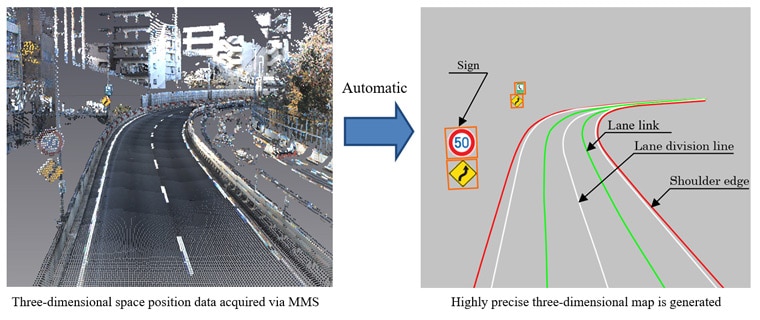FOR IMMEDIATE RELEASE No. 3091
Mitsubishi Electric Develops Technologies for Automated Mapping and Extraction of Transitions in Mapping Landscape for High-precision 3D Maps Essential in Autonomous Driving
Combination of AI and proprietary Mobile Mapping System could help hasten autonomous driving
TOKYO, March 16, 2017 - Mitsubishi Electric Corporation (TOKYO: 6503) announced today that it has developed technologies for automated mapping and extraction of transitions in mapping landscape based on artificial intelligence (AI) and the company's own Mobile Mapping System (MMS) for highly precise three-dimensional maps that provide static information of roads and surrounding objects, intending to form the basis for dynamic maps indispensable for autonomous driving. As a forerunner in the industry, Mitsubishi Electric aims to contribute to the early implementation of maps that offer constantly updated dynamic information, such as traffic signals and information about surrounding vehicles etc., for safe, highly precise autonomous driving.
Both technologies will be exhibited for the first time at CeBIT 2017 in Hannover, Germany at the Mitsubishi Electric booth in Hall 4, booth A38 (24) from March 20 through March 24, 2017.

Automated Mapping Technology
The automated mapping technology uses AI to quickly create precise, accurate three-dimensional maps. Only necessary information, such as road markings and traffic signs, is extracted from laser-point clouds and camera data measured and collected by MMS. Mitsubishi Electric's MMS provides 3D positional information of roads and roadside structures with an absolute precision within 10cm or less, which is collected via a system consisting of laser scanners, cameras and GPS antennas, while driving. AI improves the precision of extraction and recognition of the only data necessary, resulting in some 10 times faster map creation compared to industry-standard manual creation. The system also costs less than conventional methods.
Technology for Extraction of Transitions in Mapping Landscape
Mitsubishi Electric is using its difference extraction technology for earlier establishment of the dynamic map itself and more efficient updating and maintenance at a faster pace. By automatically extracting characteristic points of past data and the latest laser-point cloud data measured with MMS, the difference extraction technology is able to distinguish differences and changes where characteristic points do not match. Thanks to this technology, the maintenance of dynamic maps and the updating of precise 3D maps can be accomplished much faster by automatic extraction of only the points that has changed, compared to updating the entire map each time.
Looking ahead, Mitsubishi Electric plans to sell software utilizing this automated mapping and difference extraction technologies to map publishers including Dynamic Map Planning Corporation this coming October. The software will be used for the creation of highly precise 3D maps of expressways in Japan.
Background
Automated driving in Japan is expected to evolve from advanced driver assistance systems (ADAS) to automatic-driving level 3 (conditional autonomous operation) between 2019 and 2020, creating further demand for related systems. Automatic driving systems will require combinations of in-vehicle sensors as well as dynamic maps, of which the biggest challenges would be to keep the map information constantly up to date. Mitsubishi Electric's new technologies for automated-mapping and extraction of transitions in mapping landscape create and renew precise 3D maps faster and efficiently, and therefore are expected to serve as the core technologies of dynamic map creation. Going forward, the company will continue contributing toward the early creation, maintenance and updating of dynamic maps indispensable for autonomous driving.
Note that the releases are accurate at the time of publication but may be subject to change without notice.
